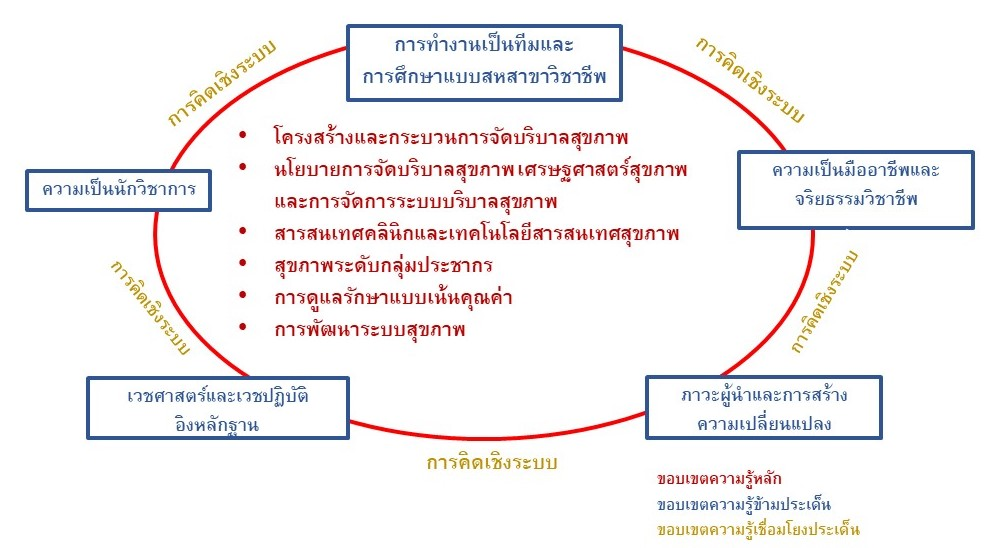Interprofessional Education (IPE) Management
Keywords:
Interprofessional Education (IPE), Interprofessional Education Program (IEP), Health System Science, transformative learning, interprofessional collaborationAbstract
Interprofessional Education Management is an educational program that provides opportunities for health and multidisciplinary students to learn activities and having a learning experience together. Once these graduates have graduated, they will be able to work professionally together as a team. Interprofessional Education is one of the competencies of the Health system science, which has been elevated to be one of the knowledges of medical education in the 21st century, as important as basic science and clinical Science. Core competencies are defined to develop learners with the ability to share values and ethics, roles and responsibilities, teamwork and leadership, learning and reflection and interprofessional communication. Learners should be given focuses on student-centered learning and experiential learning. Participate in practice and Working with the associated sector in Community by using multidisciplinary personnel in that area as special instructors to learn together, such as local government, local Health professional, etc. The ultimate goal of the Interprofessional Education is not an individual evaluation but is a view of the overall achievement of the country, graduates who end up being able to perform interprofessional collaboration with the common goal of improving the country's public health system.
Downloads
References
พระราชบัญญัติหลักประกันสุขภาพแห่งชาติ พ.ศ. 2545. (2545,18 พฤศจิกายน). ราชกิจจานุเบกษา. เล่ม 119 ตอน 116ก. หน้า 1-28.
นงลักษณ์ ใจฉลาด. ทิศทางการจัดการเรียนการสอนสำหรับผู้สอนยุคใหม่ในระดับอุดมศึกษา. วารสารมนุษยศาสตร์และสังคมศาสตร์ บัณฑิตวิทยาลัย มหาวิทยาลัยราชภัฏพิบูลสงคราม. 2557; 2: 1-13.
Subcommittee Interprofessional Education. Interprofessional education. Healthprofessional s21thailand Website. 2013. http://www.healthprofessionals21thailand.org/wp-content/uploads/2016/11/1.-Call-for-IPE-Proposals-Final-020617.pdf. Accessed May 8, 2020.
Chuenkongkaew W. The report on the annual national health professional education reform forum: ANHPER. healthprofessionals21thailand Website. 2013. http://www.healthprofessionals21thailand.org/wp-content/uploads/2016/11/book_report1-2.pdf. Accessed May 8, 2020.
Gilbert JH, Yan J, Hoffman SJ. A WHO report: framework for action on interprofessional education and collaborative practice. J Allied Health. 2010;39(Suppl1):196–197.
อังคณา สมนัสทวีชัย, วลัยพร พัชรนฤมล, โสภณ เอี่ยมศิริถาวร, วันทนีย์ กัลล์ประวิทธ์, ปานเทพ รัตนากร, วิโรจน์ ตั้งเจริญเสถียร. วิวัฒนาการของความร่วมมือภายใต้แนวคิด "สุขภาพหนึ่งเดียว" ในประเทศไทย. วารสารวิจัยระบบสาธารณสุข. 2557;8:292-305.
กองยุทธศาสตร์และแผนงาน สำนักงานปลัดกระทรวงสาธารณสุข. แผนยุทธศาสตร์ชาติ ระยะ 20 ปี ด้านสาธารณสุข (พ.ศ. 2560 - 2579) (ฉบับปรับปรุงครั้งที่ 2 พ.ศ. 2561). กระทรวงสาธารณสุข. 2561.
ประกาศแพทยสภา เรื่อง เกณฑ์ความรู้ความสามารถในการประเมินเพื่อรับใบอนุญาตเป็นผู้ประกอบวิชาชีพเวชกรรม พ.ศ.2555. แพทยสภา. 2555. https://www.tmc.or.th/file_08062012 .pdf เมื่อ 13 เมษายน 2563.
ศูนย์เวชบัณฑิตศึกษาแห่งประเทศไทย. คู่มือการตรวจประเมินคุณภาพสถาบันฝึกอบรมหลังปริญญาตามเกณฑ์ WFME. แพทยสภา. 2561. https://tmc.or.th/tcgme/file_download/คู่มือการตรวจประเมินคุณภาพสถาบันฯ_(WFME).pdf เมื่อ 13 เมษายน 2563.
ประกาศกระทรวงศึกษาธิการ เรื่อง มาตรฐานคุณวุฒิระดับปริญญาตรี สาขาพยาบาลศาสตร์ พ.ศ. 2560. (2561, 3 มกราคม). ราชกิจจานุเบกษา. เล่ม 135 ตอนพิเศษ 1ง. หน้า 7.
สภาเทคนิคการแพทย์. มาตรฐานคุณวุฒิระดับปริญญาตรี สาขาเทคนิคการแพทย์ (มคอ.๑). สภาเทคนิคการแพทย์. 2560. http://www.mtc.or.th/file_news/file1_79.pdf เมื่อ 18 สิงหาคม 2563.
สภาเภสัชกรรม. มาตรฐานคุณวุฒิระดับปริญญาตรี สาขาเภสัชศาสตร์ (หลักสูตรหกปี). สภาเภสัชกรรม. 2558. http://www.mua.go.th/users/tqf-hed/news/data6/Pharmacy_r.pdf เมื่อ 18 สิงหาคม 2563.
ราชวิทยาลัยจุฬาภรณ์. ยุทธศาสตร์ราชวิทยาลัยจุฬาภรณ์ ระยะเวลา 5 ปี (พ.ศ.2560-2564). ราชวิทยาลัยจุฬาภรณ์. 2561. https://www.cra.ac.th/wp-content/uploads/2019/03/ยุทธศาสตร์-รจภ.pdf เมื่อ 20 เมษายน 2563.
Gonzalo JD, Dekhtyar M, Starr SR, Borkan J, Brunett P, Fancher T, et al. Health Systems Science Curricula in Undergraduate Medical Education: Identifying and Defining a Potential Curricular Framework. Acad Med. 2017 Jan;92(1):123–31.
BC’s Practice Education Committee. Advancing Teamwork in Healthcare: A guide and toolkit for building capacity and facilitating interprofessional collaborative practice and education. DAL website.2013. https://cdn.dal.ca/content/dam/dalhousie/pdf/healthprofessions/Interprofessional%20Health%20Education/BCAHC%20-%20IPE%20Building%20Guide%20-%20January%202013-1.pdf. Accessed April 28, 2020.
คณะกรรมการมูลนิธิพัฒนาการศึกษาบุคลากรสุขภาพแห่งชาติ. การศึกษาแบบสหสาขาวิชาชีพ (Interprofessional Education). พิมพ์ครั้งที่ 2. บริษัท พี.เอ.ลีฟวิ่ง จำกัด; 2561. http://www.healthprofessionals21thailand.org/wp-content/uploads/2018/09/Thai-IPE.pdf เมื่อ 13 เมษายน 2563.
The Miller’s pyramid and prism. GP training website. 2015. http://www.gp-training.net/training/educational_theory/adult_learning/miller.htm. Accessed April 20, 2020.
Heinemann GD, Schmitt MH, and Farrell MP. Attitudes toward health care teams. In Heinemann GD, and Zeiss AM. eds. Team performance in health care: Assessment and Development. New York: Kluwer Academic/Plenum Publishers, 2002:155-159.
Curran V. R., Sharpe D., Forristall J., and Flynn, K. Attitudes of health sciences students towards interprofessional teamwork and education. Learning in Health and Social Care, 7(3), 2008:146¬‐156.
Olle ten Cate. A primer on entrustable professional activities. FEM 2017; 20(3): 95-102.

Downloads
Additional Files
Published
How to Cite
Issue
Section
License
Copyright and Disclaimer
Articles published in this journal are the copyright of Chulabhorn Royal Academy.
The opinions expressed in each article are those of the individual authors and do not necessarily reflect the views of Chulabhorn Royal Academy or any other faculty members of the Academy. The authors are fully responsible for all content in their respective articles. In the event of any errors or inaccuracies, the responsibility lies solely with the individual authors.


